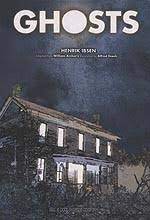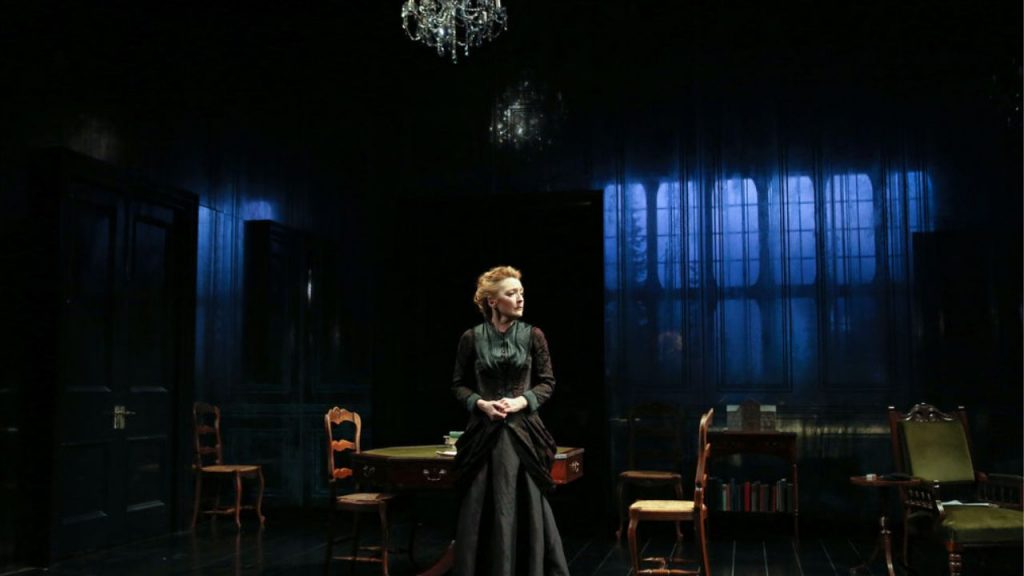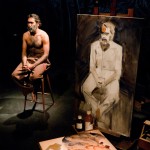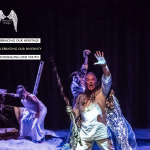Genre: Drama
Venue: Sell A Door Theatre playing at Greenwich Theatre Greenwich Theatre Crooms Hill London SE10 8ES
Low Down
Sell A Door Theatre Company’s use of Alfred Enoch’s adaptation of Ibsen’sGhosts is at the heart of why their production is so effective.
Firstly, Enoch’s adaptation of the play’s original setting of the “landscape of a fjord” to Scotland’s Orkney Islands, seems to allow director, Anna Fox, to retain Ibsen’s highly dramatic intention to create the effect of a misty backdrop out of which the actors step onto stage: either into the main setting of the conservatory in the Alving house or in what appear to be shadowy, secretive places around it.
More than that, the presentation of the Orcadian setting seems to also play on the rich and problematic history of the UK’s Celtic origins which brings with it its own historical conflicts, not the least via the strict Calvinistic views of morality presented through the character of Pastor Manders in the play.

From where I sat, the barely visible outline of the Orkneys, splashed impressionistically across the backdrop, appeared at times like the body of sleeping giant, stretched out across the horizon. At other times, the scenery seemed to breathe and move, as well as bellow-out sail-like with the flow of air across the stage: all due to designer Anna Lewis’s decision to construct the walls of the Alving house from scrim-like material. Then, through Alexander Ridgers’s lighting design, the walls go from appearing opaque to transparent and back again, mirroring the play’s theme of hiding and revealing secrets.
So, from the outset, while the world on stage gives the appearance of a well-to-do 19th century Orcadian household complete with a beautiful conservatory, the effect of shadowy doorways, with figures lurking about in other rooms, create the feeling that the house has ‘ghosts’ who might at any moment move onto the stage.
What is to be revealed? For fear of diminishing the productions gripping effects I won’t give too much away, suffice to say that the revelations centre on the now deceased head of the house, Captain Alving.
Review
The action of the play begins in a superbly ironic moment, ten years after Captain Alving death, at a time when Mrs Alving finally believes that she has laid the ghosts of the past to rest. She has managed to redeem her husband’s misspent life by using his money to build an orphanage in his name. Her son Oswald has also finally returned home to take up his rightful place as Captain Alving’s heir at the official opening of the orphanage.
The production is supported by a capable ensemble of actors who each show how the secrets around Captain Alving continue to live on, phantom-like, in their lives: his widow, Helene Alving; their son Oswald; the family’s priest, Pastor Manders; the servant girl, Regina Engstrand and her father, Jacob Engstrand.
Set over twenty-four hours, Anna Fox’s direction shapes Ibsen’s narrative, taking care to work tensions and ironies which such a well-written play gives her. Ms Fox particularly demonstrates, I believe, a good understanding of the power of subtext in exposing ‘the truth’ in the play. She seems to be able to the performers room to work in their respective strengths and prevent the action of the play becoming melodramatic.
Deborah Blake plays Mrs Alving with an understated vigour which I thought with the representation of a woman trapped by marital convention yet determined to survive her loveless marriage. Ms Blake shows us Mrs Alving as a deeply compromised woman, a woman who has held her family together despite her husband’s predatory sexual behaviour towards other women yet, as we witness in her capitulation to Pastor Manders over the matter of insurance for the orphanage, she fails to go the next step and claim her power to decide on matters outright.
In contrast, Tamaryn Payne, depicts Regina Engstrand as a calculating young women who has no intention of remaining in the lowly class into which she is born. Ms Payne shows this in no uncertain terms in the opening moments of the play, when confronted by her father Jacob’s request to come and work for him in a new hostel for sailors he intends to open in the town.
Liam Smith portrayal of Jacob Engstrand, the humble carpenter, mirrors Mrs Alving’s role as the keeper of secrets regarding what happened to his deceased wife Johanna when she worked in the Alving house. We are never quite sure if Smith is as genuinely kind and innocent as he presents to the Pastor and Mrs Alving or whether he is just might be wily enough to know how to get the better of them.
Robert Gill’s performance of Pastor Manders raised many laughs from the audience. Manders is such an extreme character, full of moral righteousness, yet Gill is able to bring a sense of complexity to his portrayal of him. I felt however that I would have like to see more of the effort needed for such a character to repress his sexual desire in order to remain fixed on his black and white views. Ibsen gives many clues of that struggle in the dialogue between him and Mrs Alving.
Jason Langley faces an interesting challenge in playing Oswald as a character inflicted with congenital syphilis since the illness has been more or less eliminated through advances in the medical treatment of sexual transmitted diseases with penicillin.
Yet the illness remains crucial one in linking Captain Alving death through syphilis and Oswald’s deteriorating mental and physical health. In a 2009 article in the medical/ psychology journal Dermanities, Leonard Hoenig writes
In 1881, Henrik Ibsen’s play, Ghosts, created a sensation in the theatrical world by bringing to center stage the taboo topic of venereal disease. Although syphilis is not mentioned by name in the play, it is clear that a major character, Oswald Alving, is suffering from congenital neurosyphilis.[1]
While the actor can show Oswald dreading his predicament, a modern audience cannot be expected to understand shock felt by Ibsen’s contemporaries. My own reaction towards Oswald was more like viewing someone afflicted with cancer. But, as explained in Hoenig’s article, congenital, untreated syphilis is horrifically disfiguring. The poignancy of Oswald asking his mother to kill him at the first sign of the disease is made only more powerful if we understand that horror. Nonetheless, Langley’s portrayal of Oswald as a lost boy as well as a doomed youth is noteworthy. His understanding of Regina’s ruthlessness is also well played as he explains to his mother how she would not have been afraid of ‘saving’ him, the euphemism he uses in requesting euthanasia.
The one criticism I have of the production is its handling of the destruction of the orphanage. It is a crucial scene whose impact should not be underestimated in creating the overall power of the production. The change of a lighting state that I viewed was not enough for me to experience the emotional impact of the destruction first hand. As a result during the play’s denouement, Mrs Alvings’s seems more hysterical rather than as a tragic figure, grappling, not with the ghosts of the past, but with the monstrous truth of her son’s imminent death.
Despite this, I commend Sell-A-Door Theatre for producing Ghosts: it is an entirely relevant play for today, given recent headlines about the sexual abuse of young people in the UK. Subsequent police investigations indicate how dark secrets rise like tormented ghosts, chilling the hearts of the living right through the years in which the truth is ignored and killing the coming of a productive future.
[1] http://www.dermanities.com/detail.asp?article=282
Reviewed by Dr Josey De Rossi Tuesday 30 April
Website :
http://www.greenwichtheatre.org.uk/
and
http://www.selladoor.com/Sell_a_Door_Theatre_Co._Ltd/Welcome.html






